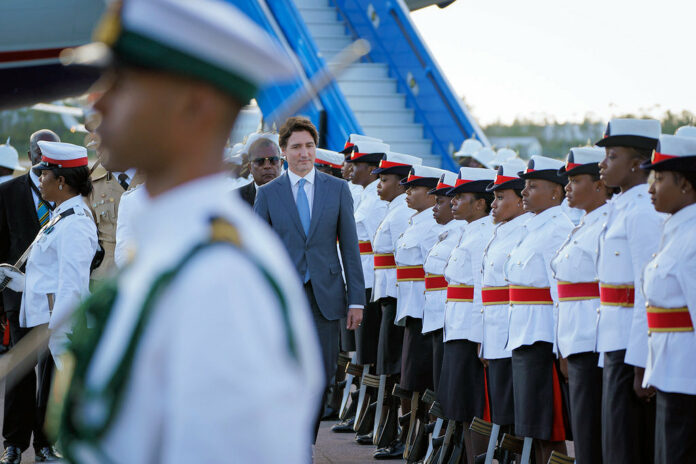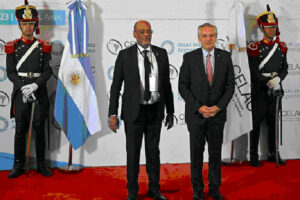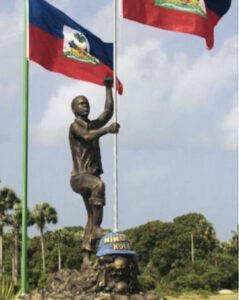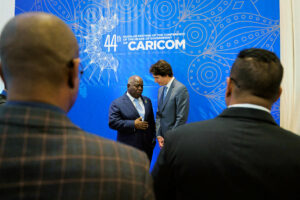
(Part 1)
At the behest of Washington, Canada has begun a “significant military deployment in Haiti,” according to Canadian Ambassador to Haiti Sébastien Carrière.
Despite U.S. pressure since last October, Canada played hard to get in accepting the responsibility for leading the third foreign invasion of Haiti in the past three decades. But now, it has relented.
“We took over,” Carrière told journalist Madeleine Blais-Morin on the program Les Coulisses du Pouvoir on Feb. 19. “We delivered armor. There have been two deliveries since October. There would be a third delivery in the next few days, and another one later in February. There is this CP-140 surveillance operation, intelligence sharing, there are ships arriving. Listen, it’s still military deployment in a significant way.”

This deployment is justified by Haitian de facto Prime Minister Ariel Henry’s request to the United Nations on Oct. 7, 2022 for a foreign “special military intervention” into Haiti to fight “gang violence.” But the Haitian people’s overwhelming hostility to this proposal can be understood by Haiti’s recent experience with UN military occupation.
MINUSTAH – Haiti’s Occupation by a Brazilian-led UN Military Force
On the day that a U.S. SEAL team kidnapped President Jean-Bertrand Aristide from his home in the Port-au-Prince suburb of Tabarre on Feb. 29, 2004, the U.S., Canada, and France landed troops in Haiti, militarily occupying the country for the next three months.
Then on Jun. 1, 2004, they handed off the occupation to a much more cheaply paid multinational army called the UN Mission to Stabilize Haiti or MINUSTAH.
Although the force varied in size over the 13 years it was deployed in Haiti, MINUSTAH averaged about 9,000 military troops and 4,000 police officers from 56 mostly poor countries around the world. Brazil led the mission in which Latin American soldiers predominated, mostly from Brazil, Argentina, Chile, Bolivia, Ecuador, and Uruguay. Ironically, most of these nations were then led by “pink tide” presidents who should have shunned collusion with Northern imperialist powers in policing Haiti after a clearly U.S.-backed coup, as Venezuela and Cuba did.
“MINUSTAH is how the U.S. has outsourced its control of Haiti.”
“MINUSTAH is how the U.S. has outsourced its control of Haiti,” author and activist Bill Quigley explained. The UN force helped consolidate the post-coup government of Washington’s puppet Gérard Latortue and committed multiple crimes and massacres against the Haitian people. In 2010, Nepalese UN soldiers introduced cholera into the country leading to over 10,000 deaths and hundreds of thousands were sickened. Meanwhile, MINUSTAH’s first commander, a Brazilian general, “complained of the pressure to use violence and resigned his position by fall 2005.”
MINUSTAH soldiers also committed hundreds of acts of rape and sexual assault on Haitian women and minors, even operating a child-sex ring. Multiple cases of rape and poverty-compelled prostitution left at least 265 children abandoned when MINUSTAH left Haiti.
The UN occupation effectively throttled Haitian democracy, helping to install the Haitian Bald Headed Party (PHTK) as the dominant force in Haitian politics in 2011. Under PHTK rule, state institutions have been dismantled or withered, so that today de facto Prime Minister Ariel Henry rules without a single elected official.
A monument built in Port Salut to MINUSTAH’s victims captures the feelings of most Haitians: a pile of skulls with a UN blue helmet on top with the words “MINUSTAH, Kolera.” A Haitian man stands above, impaling the helmet with a flagpole flying the Haitian bicolor, his fist raised in defiance.
Opposition to CELAC’s Support for an Intervention in Haiti
A day before January’s CELAC Summit, Lula received a letter from “Mouvement Dialogo 2000” that was signed by two prominent Argentinians: artist, peace activist, and Nobel-Prize-winner Adolfo Perez Esquivel and long-time human rights activist and co-founder of “Mothers of the Plaza de Mayo”, Nora Cortiñas.

“We particularly call on the Brazilian government, which you preside over, to support the Haitian people’s rights by rejecting any military intervention, by withdrawing from the ‘Core Group,’ and by working for its dissolution, and the closure of the UN trusteeship office (BINUH),” the letter reads.
“The Haitian people are rising up against the enormous social and political crisis they face and the threat of a new military occupation that the United States is openly promoting” and demand “the resignation of the de facto government of Ariel Henry – a government not elected by the Haitian people but imposed and supported by those powers through the disastrous ‘Core Group’ – and total respect for its sovereignty and self-determination.”
Movement Dialogo 2000, Esquivel, and Cortiñas also “categorically reject these new attempts at occupation and any interference.”
It is evident why many fear that Lula might again throw his support behind another foreign intervention in Haiti. He has never acknowledged or apologized for Brazil’s role in undermining Haitian democracy and sovereignty by leading MINUSTAH’s military force. His huge influence in Latin America could have a direct influence on whether a multinational “special military force” or “security assistance” will be assembled and sent to Haiti.
As the Black Alliance for Peace (BAP) points out, nowhere in the Buenos Aires “declaration do they mention the role of the international community in creating the current crisis in Haiti. Nowhere do they mention that the crisis is a crisis of imperialism, brought on by the United Nations, the Core Group, the United States, Canada, and other so-called ‘friends’ of Haiti in the international community.”
The risk remains that Lula might “exceptionalize” Haiti again, as he did in 2004. “CELAC’s position on Haiti is ill-informed and dangerous, representing an all-too-frequent, reactionary ‘Haiti exception’ when it comes to the ‘progressive’ governments of the Americas,” BAP concluded.
Indeed, Lula’s February visit with U.S. President Joe Biden ironically focused on “supporting democracy” (which Washington has repeatedly sabotaged in Brazil) and included a discussion on “insecurity in Haiti.” It remains to be seen whether, as Dr. Jemima Pierre has observed, the leftism of the Americas “collapse[s] at the door of Haitian sovereignty” and betrays “a people that have given so much to the struggles for sovereignty and independence in the region.”
Gauging the Support for an Intervention of Haiti by CARICOM and its Members
CELAC’s receptiveness to a foreign military intervention in Haiti is shared by a few key Caribbean governments.
On the same day that CELAC published the Buenos Aires Declaration, CARICOM issued a statement that it had begun contacting “Haitian stakeholders over the past few weeks about their willingness to attend a meeting in a CARICOM country.” The regional body reiterated its desire to assist in bringing all stakeholders “together in their search for a consensus agreement.”
Despite “reaching out to stakeholders,” CARICOM only invited Ariel Henry to represent Haiti at their three-day 44th biannual meeting that began Feb. 15 in Nassau, Bahamas. Other political factions and civil society groups were not invited.
(Jamaican PM Andrew Holness led a CARICOM delegation to Haiti for a Feb. 27 visit. In addition to sitting with Haiti’s de facto prime minister and his new government, the delegation also met with the Montana Accord coalition, Henry’s principal rival for power. The CARICOM delegation “agreed to provide direct support to the Haitian National Police to help bolster security,” according to the Bahamian daily The Tribune.)
Haiti’s security crisis was top of the list for discussion in the bilateral meetings held between heads of government. This gathering also focused on the waves of Haitian migrants arriving on the shores of CARICOM countries as they flee poverty and worsening violence. Several members have complained about the expenses involved in housing and deporting these “migrants” – refugees fleeing violence and deprivation.
At the meeting, CARICOM, for the time being, rejected the call for military intervention. “Those of us on the periphery who might be calling in troops and so on, it’s a bit premature on our part,” said the CARICOM’s Minister of Foreign Affairs, Dr. Amery Browne.

But, according to a CBC report, “both Jamaica and the Bahamas have said they are willing to contribute by sending members of their own security forces. Other Caribbean countries that have forces that could assist in such a mission include Barbados, Belize, Guyana, Suriname, and Trinidad and Tobago.”
Jamaican PM Andrew Holness had previously stated that “Jamaica would be willing to participate in a multinational security assistance deployment.”
The leadership of Guyana had also previously stated that they support a military intervention in Haiti.
The Bahamas’ Prime Minister Philip Davis sees the increased flow of Haitian refugees as “a substantial threat,” and said he “would send troops or police to Haiti as part of a peacekeeping force if asked to do so by the United Nations or the Caribbean Community.”
Nonetheless, Davis wants the leadership of his powerful northern neighbors. “What we in CARICOM have come to appreciate is that we do not have the resources to be able to deal with the Haiti problem ourselves, and we do need outside help and that help, we are looking to the North, to Canada and the United States, to come to the fore,” he said.
The Bahamian Foreign Minister Frederick Mitchell stated the matter clearly: “Canada has been asked to take the lead.”
Canada played a a leading role in the 2004 coup against democratically elected President Jean-Bertrand Aristide.
Therefore, Canadian Prime Minister Justin Trudeau was accompanied by Ambassador to Haiti Sébastien Carrière, Ambassador to the UN Bob Rae, and his national security adviser Jody Thomas when they all attended CARICOM’s biannual meeting. Trudeau announced that Canada will provide $12.3 million in new humanitarian assistance and $10 million for the International Office on Migration (IOM) to support migrants in the region.
Trudeau recently confirmed sending a Canadian military plane to surveil Haiti and support “anti-gang” operations. At the CARICOM meeting, he announced that Canada’s sending of two Kingston-class naval vessels to patrol the waters around Haiti. This is on top of sending many armored vehicles to the Haitian National Police (PNH) to “combat gangs.”
According to a statement on Trudeau’s website, he had bilateral meetings with the leaders of Barbados, the Bahamas, Jamaica, and Haiti, who all want foreign military intervention in Haiti.
A coalition of countries willing to back a military intervention in Haiti is forming. Trudeau has stated that Canada is not willing to lead a multinational “special military force” into Haiti, but has been trying to get a regional body – CARICOM, CELAC, or the Organization of American States (OAS) – to take the lead. If this does not work, an ad hoc “Coalition of the Willing,” made up of a hodgepodge of Latin American and Caribbean nations may have to suffice.
Although today acting coy, Canada played a a leading role in the 2004 coup against democratically elected President Jean-Bertrand Aristide and has doggedly supported Ariel Henry, despite his illegitimacy and evidence of his involvement in Jovenel Moïse’s murder.
Meanwhile, the Caribbean’s most vociferous cheerleader for foreign military intervention into Haiti is the neighboring Dominican Republic, which is not a CARICOM member. In January, President Luis Abinader recently reiterated his call to “build a strong military force to help the Haitian National Police.” Over the past year, Abinader has expelled tens of thousands of Haitians and Dominicans of Haitian descent from the Dominican Republic, including pregnant women.
Travis Ross is a teacher based in Montreal, Québec. He is also the co-editor of the Canada-Haiti Information Project at canada-haiti.ca. Travis has written for Haiti Liberté, Black Agenda Report, TruthOut, and Rabble.ca. He can be reached on Twitter.










[…] How the U.S. and Canada are Wooing Latin America and the Caribbean to Front for their Plan to Invade… Haiti Liberte […]
[…] I have a lot of outspoken beef (despite being vegan, ha) with the United States, but it'd be remiss if I left out how Canada's role in continuing war in the global South is because of their want to remain in favor with the US. https://haitiliberte.com/how-the-u-s-and-canada-are-wooing-latin-america-and-the-caribbean-to-front-… […]
but has been trying to get a regional body?
[…] handful of Caribbean and African nations have offered to provide personnel or soldiers to support the PNH. Efforts by the UN and Washington […]
[…] MINUSTAH’s initial mandate was also for only six months, starting in 2004 following the coup against democratically elected President Jean-Bertrand Aristide. The mandate was extended several times. MINUSTAH occupied Haiti for 13 years – until 2017, where it was replaced by another Chapter VII armed force, MINUJUSTH. […]